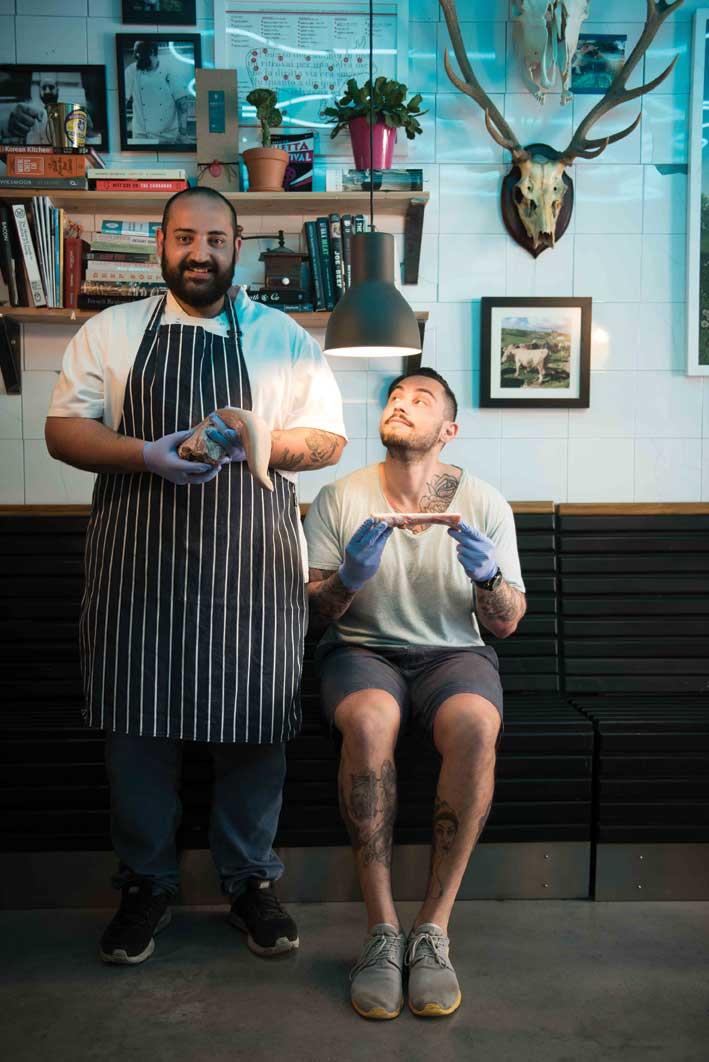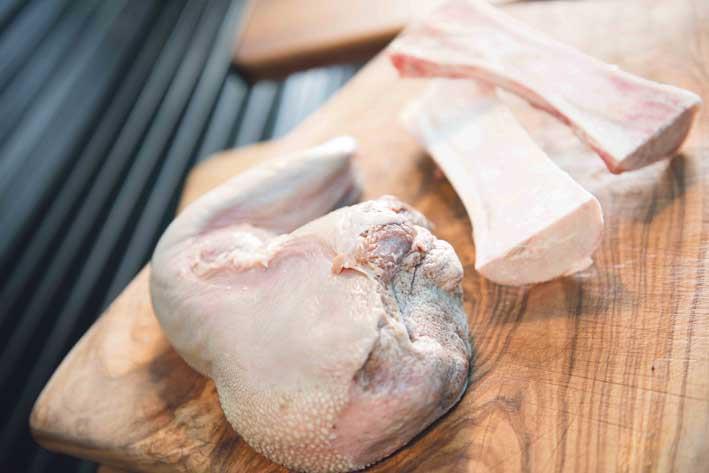We drive south from Valletta on a cool Monday afternoon, navigating slowly through the after-work traffic in the direction of Marsa. Next to the Open Centre, the smell of sizzling grilled meat wafts through the car window from a nearby barbeque; we drive past the abattoir, its façade adorned by the limestone bust of a bull.
After driving past vineyards and farmland the sea comes into view, becoming dotted with the brightly-coloured fishing boats alongside Marsaxlokk's quay. We settle at a table made from a converted wine barrel outside one of the local eateries and a waiter brings us a bottle of Sicilian dry red. The ubiquitous food references on the drive down have not been lost on me, especially in the light of this issue's interview.

Tommy doesn't mince his words and jumps right in - saying that he fails to understand why the local culinary identity and landscape at times appear as if their evolution has stalled. He thinks we have fallen short of doing justice to what the country is capable of providing in terms of food. Sicily is roughly 52 nautical miles (96 km) away and has a dozen or so Michelin-Star restaurants! It is mind-boggling that Malta is nowhere near approaching this standard. Even the Faroe Islands, bang in the middle of The Atlantic and with a population the size of Birkirkara, has one! Nick agrees, and makes it abundantly clear that there is a noticeable absence of endemic pride in the way we feel about and produce our food. Despite Sicily being less affluent, it has managed to effectively harness the natural resources at its disposal, as well as its traditional relationship with food, to have carved out an international reputation to be reckoned with. The cardinal difference lies in the fact that in Sicily, 'eating local' is the undeniable norm.
When it comes to cheeses, Pecorino and Ragusano reign supreme. On the other hand, within our shores Cheddar still seems to be the popular favourite. There seems to be a prevalent trend for eating things that are neither farmed, reared or caught here. Beef (steaks in particular) tuna and salmon are still the default choice for shoppers and restaurant goers. Excluding the fact that tuna and salmon are being caught at potentially unsustainable rates (hence necessitating the introduction of quotas as well as harmful fish feed for fattening), the carbon footprint associated with these foods, when factoring in cooling and transportation, makes them additionally worrying for the environment.

Tommy raises an eyebrow and mentions that the frequency and volume of meat consumption in Malta is also peculiar. Although the country is surrounded by sea, the footprint of meat looms large on farms and in supermarket aisles alike. Tommy explains further: it's not that one should not eat meat, but that when it is eaten, it should be a treat and cooked appropriately. More importantly, an animal should be consumed from tongue to tail. Nick is in agreement: he tells me that offal was regularly prepared in their home when they were growing up. Tripe, oxtail soup or sweetbread (the generic term for glands) are all delicacies that are often overlooked by consumers. These underestimated items of meat are also highly nutritious and delicious when prepared well. Making use of as much of the livestock as possible demonstrates a degree of respect for the creature itself while effectively making better use of the resources that went into rearing it.
Despite the country's extremely culturally diverse history, and the multitude of international influences that have left their mark on who and what we are today, it is the 150 years of British rule that still flavours our food. Some British staples in the national culinary make-up are the dominant gene in the island's cuisine.
The situation as far as fish consumption is concerned can also be remedied: the public must get over its fixation with tuna and salmon. Both brothers sing praise for mackerel and its roe. Often used as feed for other fish and for cat food, this sustainable and locally available fish tastes simply amazing when smoked. Squid is also quite abundant and can be used to make mouth-watering dishes.
Nick points out that most Mediterranean villages and towns give a lot of importance to food markets selling local delicacies and produce. Although there is the farmer's market, it is unfortunately placed in Ta' Qali when it should clearly be given more prominence. It sometimes feels as if Maltese food is treated like a secret. Tommy and Nick agree that the solution lies in education, preferably from a young age. All children should at least visit a farm once and learn something about food production and schools should teach ways of making use of seasonal and locally produced ingredients.
Food is such an undeniably integral part of life that it should transcend mere functionality. People should be more adventures with what they eat, should try that fish or that cut of meat that they normally never buy and look up ways to cook them. Developing a relationship with the person from whom you buy your food is also equally important. Your local butcher and fishmonger may be able to source and provide you with more sustainable fish types. The fish4tomorrow website (an initiative by a local not-for-profit NGO) has a user-friendly guide listing which fish currently have sustainable stocks and those that do not.
Finally - and perhaps most importantly - the obsession with large portion sizes must desist: the post-war mentality of eating until you are stuffed serves no-one today. We must move from quantity and cost as the primary determinants of good food to quality and value. It is by truly caring about the processes and provenance of one's nutrition that a more discerning consumer can be cultivated.